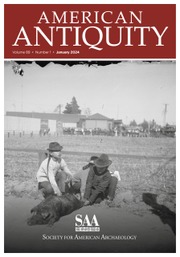This year I have used this column to introduce you to members of the American Antiquity Editorial Board. Information about Stephen Acabado (UCLA), Sabrina Agarwal (UC Berkeley), Michael Blakey (William and Mary), Lewis Borck (University of Oklahoma, Norman), Craig Cipolla (Tufts), Alan Farahani (Sciscope Solutions), Ayana Omilade Flewellen (Stanford), Maria Franklin (UT Austin), and Sara Gonzalez (University of Washington) has already been shared. In this column, I introduce you to four more board members whose dedication is valuable in shaping the mission and vision of this journal.
Lindsay M. Montgomery received her PhD from Stanford University in 2015 and is an associate professor in the Department of Anthropology and Centre for Indigenous Studies at the University of Toronto in St. George. Her research uses archaeological and ethnohistorical sources to historicize Indigenous cultural landscapes, mobility patterns, and interethnic interactions in the North American West. Her current work draws on Indigenous philosophy and collaborative community-based research methods to document the agricultural landscape of Picuris Pueblo and the tribe's evolving relationships with Pueblo, Apache, Kiowa, and Hispano peoples in New Mexico. She recently published Objects of Survivance: A Material History of the American Indian School Experience (Montgomery and Colwell Reference Montgomery and Colwell2019) and A History of Mobility in New Mexico: Mobile Landscapes and Persistent Places (Montgomery Reference Montgomery2021).
Kathleen A. Sterling received her PhD from the University of California, Berkeley, and is currently an associate professor of anthropology and an affiliate in Women, Gender, and Sexuality Studies at SUNY Binghamton. Her research focuses on the French Pyrenees, where she is codirector of Peyre Blanque, a Paleolithic site. Her research interests include Paleolithic technology, learning and identity, communities of practice, gender and feminist science, Black feminist theory, landscape archaeology, and sociopolitics of archaeology (Sterling Reference Sterling2015, Reference Sterling and Silliman2018). She is particularly interested in dispelling myths about human ancestors as violent and primitive, as well as focusing on equal opportunities and knowledge production in anthropology, STEM, and academia.
Paulette Steeves (Cree-Metis) received her PhD from SUNY Binghamton in 2015. She is the Canada Research Chair, Tier II Healing and Reconciliation, and associate professor in the Department of Sociology and Anthropology at Algoma University. Her research focuses on Native American and First Nations histories and Pleistocene histories of the Western Hemisphere, as well as the decolonization of anthropology and academic knowledge production (Steeves Reference Steeves2020). She is particularly passionate about challenging Clovis First theories and arguing that Indigenous people were present in the Western Hemisphere as early as 100,000 years ago. She recently published The Indigenous Paleolithic of the Western Hemisphere (Steeves Reference Steeves2021).
Barbara L. Voss received her PhD in Anthropology with a Designated Emphasis in Women, Gender, and Sexuality from the University of California, Berkeley, in 2002. She is a professor of anthropology at Stanford University and is also affiliated with the Stanford Archaeology Center and the Center for Comparative Studies of Race and Ethnicity, Program on Asian American Studies, Program on Urban Studies, and the Program on Gender and Sexuality Studies at Stanford. She is a historical archaeologist focusing on transnational cultural encounters on the Pacific Rim, including European colonial projects and nineteenth-century migration from southern China. She has collaborated with several community-based projects, including the Market Street Chinatown Archaeology Project, Chinese Railroad Workers in North America Project, Research Cooperation on Home Cultures of 19th-Century Overseas Chinese, Cangdong Village Project, and Arboretum Chinese Labor Quarters. Previous publications include The Archaeology of Ethnogenesis: Race and Sexuality in Colonial San Francisco (Voss Reference Voss2008) and The Archaeology of Colonialism: Intimate Encounters and Sexual Effects (Voss and Casella Reference Voss and Casella2012). More recently, she has published on cultures of harassment in archaeology (Voss Reference Voss2021).


